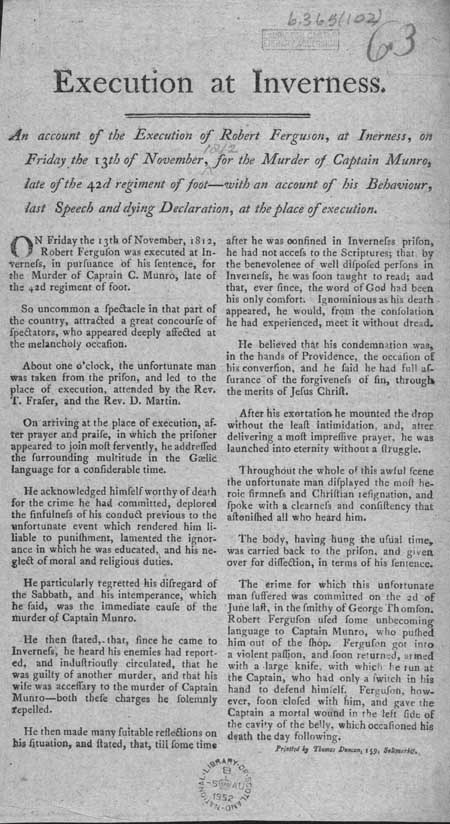Transcription
Execution at Inverness. An account of the Execution of Robert Ferguson, at Inerness, on
Friday the 13th of November, 1812 for the Murder of Captain Munro,
late of the 42d regiment of foot-?with an account of his Behaviour,
last Speech and dying Declaration, at the place of execution. ON Friday the 13 th of November, 1812,
Robert Ferguson was executed at In-
Verness, in pursuance of his sentence, for
the Murder of Captain C. Munro, late of
the 42d regiment of foot. So uncommon a spectacle in that part of
the country, attracted a great concourse of
spectatprs, who appeared deeply affected at
the melancholy occasion. About one o'clock, the unfortunate man
was taken from the prison, and led to the
place of execution, attended by the Rev.
T. Fraser, and the Rev. D. Martin. On arriving at the place of execution, af-
ter prayer and praise, in which the prisoner
appeared to join most fervently, he addressed
the surrounding multitude in the Gaelic
language for a considerable time. He acknowledged himself worthy of death
for the crime he had committed deplored
the sinfulness of his conduct previous to the
unfortunate event which rendered him li-
liable to punishment, lamented the ignor-
ance in which he was educated, and his ne-
glect of moral and religious duties. He particularly regretted his disregard of
the Sabbath, and his intemperance, which
he said, was the immediate cause of the
murder of Captain Munro. He then stated,that, since he came to
Inverness, he heard his enemies had report-
ed, and industriously circulated, that he
was guilty of another murder, and that his
wife was accessary to the murder of Captain
Munro?both these charges he solemnly
repelled. He then made many suitable reflections on
his situation, and stated, that, till some time after he was confined in Invernesss prison,
he had not access to the Scriptures; that by
the benevolenee of well disposed persons in
Inverness, he was soon taught to read; and
that, ever since, the word of God had been
his only comfort. Ignominious as his death
appeared, he would, from the consolation
he had experienced, meet it without dread. He believed that his condemnation was,
in the hands of Providence, the occasion of
his conversion, and he said he had full as-
surance of the forgiveness of sin, through
the merits of Jesus Christ. After his exortation he mounted the drop
without the least intimidation, and, after
delivering a most impressive prayer, he was
launched into eternity without a struggle. Throughout the whole of this awful scene
the unfortunate man displayed the most he-
roic firmness and Christian resignation, and
spoke with a clearness and consistency that
astonished all who heard him. The body, having hung the usual time,
was carried back to the prison, and given
over for dissection, in terms of his sentence. The crime for which this unfortunate
man suffered was committed on the 2d of
June last, in the smithy of George Thomson.
Robert Ferguson used some unbecoming
language to Captain Munro, who pushed
him out of the shop. Ferguson got into
a violent passion, and soon returned, armed
with a large knife, with which he run at
the Captain, who had only a switch in his
hand to defend himself. Ferguson, how-
ever, soon closed with him, and gave the
Captain a mortal wound in the left side of
the cavity of the belly, which occasioned his
death the day following. Printed by Thomas Duncan, 159, Saltmarket.
View Commentary | Download PDF Facsimile
|
 |
Date of publication:
1812 shelfmark: 6.365(102)
 View larger image
View larger image
|


